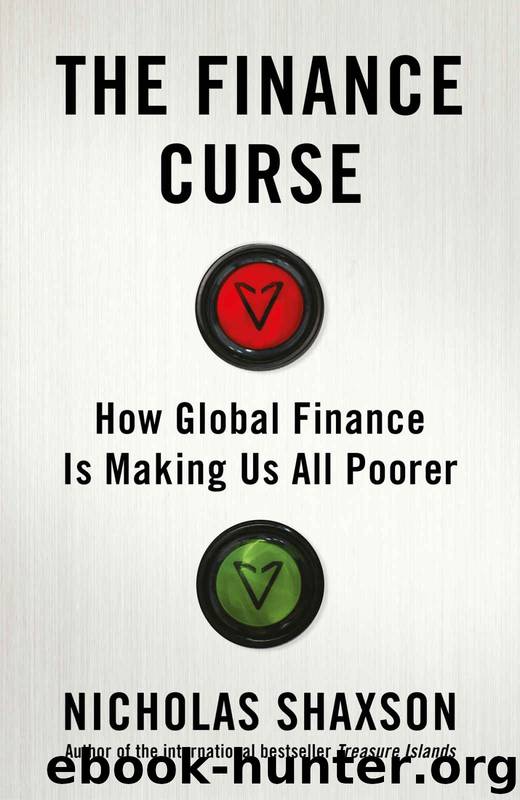The Finance Curse: How global finance is making us all poorer by Nicholas Shaxson

Author:Nicholas Shaxson
Language: eng
Format: mobi, epub
Publisher: Random House
Published: 2018-10-10T22:00:00+00:00
10
The March of the Takers
In 2012 Boris Johnson, then mayor of London, stood under an umbrella by a busy road, his blond hair whiffling in the wind. ‘A pound spent in Croydon is far more of value to the country from a strict utilitarian calculus than a pound spent in Strathclyde,’ he gushed.1 ‘Indeed you will generate jobs and growth in Strathclyde far more effectively if you invest in Hackney or Croydon or in other parts of London.’ This was an urban geography variant of the competitiveness agenda: give London what it wants, and watch the wealth pour forth and spread bountifully across the land.
Many people share Johnson’s image of London as the roaring engine of the British economy, to be treated with deference. ‘London and the south of England have been subsidising the rest of the UK,’ thundered Chris Giles in the Financial Times in 2017. His article, entitled ‘Why London deserves a thank you note from the rest of Britain’, cited official data showing that London generated nearly £16,000 in tax revenues per person, amounting to a surplus of £3,070 per head. ‘The idea that London sucks the life out of other parts of Britain is absurd,’ he said, and took up the theme on Twitter. ‘HUGE subsidies from London and South East to rest of the country … Much of UK – worse deficit than Greece … London is the UK’s cash cow. Endanger its economy and it damages UK public finances.’ In the ensuing Twitter frenzy a senior official from a City financial advisory firm called for London ‘to get itself expelled from England à la Singapore from Malaysia’.2
However, while some pundits call for more pampering for London, others urge Britain to rebalance its economy away from an excessive dependence on the capital and on financial services. As former chancellor George Osborne put it in 2011, Britain needed to be ‘a country carried aloft by the March of the Makers’. He subsequently pledged that his government would build a ‘Northern Powerhouse’ to match London’s strength.
This argument reminds me of what I used to hear on my radio almost every day when I lived in Angola in the early 1990s. Separatists in the northern province of Cabinda, historically the main oil-producing zone, have long battled for its independence so that they can keep for themselves the oil revenues that they see draining southwards to the rest of Angola. Meanwhile, other Angolan politicians constantly called (and still call) for a rebalancing of the economy away from oil and away from the country’s dominant capital, Luanda, and for the oil wealth to be treated as seed money for other parts of the economy and the country. But this rebalancing never happened, even after the end of the civil war: according to the IMF, oil and diamonds make up 99.7 per cent of Angola’s exports today, precisely the same proportion as when I lived there. One of the main reasons other sectors have not flourished is that the oil money
Download
The Finance Curse: How global finance is making us all poorer by Nicholas Shaxson.epub
This site does not store any files on its server. We only index and link to content provided by other sites. Please contact the content providers to delete copyright contents if any and email us, we'll remove relevant links or contents immediately.
| Private Equity | Valuation |
| Venture Capital |
The Black Swan by Nassim Nicholas Taleb(6192)
Bad Blood by John Carreyrou(5769)
Pioneering Portfolio Management by David F. Swensen(5606)
Millionaire: The Philanderer, Gambler, and Duelist Who Invented Modern Finance by Janet Gleeson(3569)
Skin in the Game by Nassim Nicholas Taleb(3461)
The Money Culture by Michael Lewis(3284)
Skin in the Game: Hidden Asymmetries in Daily Life by Nassim Nicholas Taleb(3264)
Bullshit Jobs by David Graeber(3180)
The Wisdom of Finance by Mihir Desai(3079)
Blockchain Basics by Daniel Drescher(2891)
Liar's Poker by Michael Lewis(2812)
The Intelligent Investor by Benjamin Graham Jason Zweig(2596)
Hands-On Machine Learning for Algorithmic Trading by Stefan Jansen(2519)
Mastering Bitcoin: Programming the Open Blockchain by Andreas M. Antonopoulos(2511)
Investing For Dummies by Eric Tyson(2470)
Fooled by Randomness: The Hidden Role of Chance in Life and in the Markets by Nassim Nicholas Taleb(2413)
The Power of Broke by Daymond John(2376)
Zero Hour by Harry S. Dent Jr. & Andrew Pancholi(2246)
Market Wizards by Jack D. Schwager(2164)
